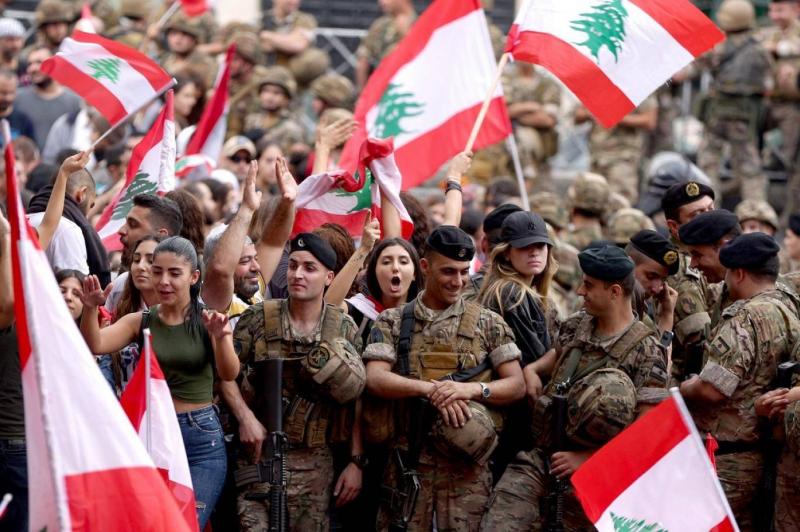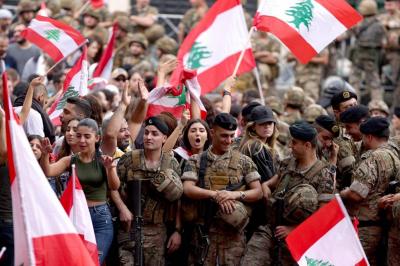The Lebanese Army's approach to any event linked to the presidential election is characterized by the notable mention of Army Commander General Joseph Aoun as a serious candidate for the presidency, both in internal and external discussions. Therefore, the "excessive force" used to handle demonstrators during the protest from Friday to Saturday last week, as described by some, particularly after testimonials from participants like Father George Souma, who were struck on the head with sticks, was interpreted from two opposing perspectives: the first is that the Army Commander is sending a presidential message to those concerned that he controls the "game in the streets," while the second is that certain political factions, through their tools within the military institution, sought to provoke the army into a confrontation with the citizens, in order to "burn" the commander’s public image and portray him as "repressing" the people.
All analyses following the army's handling of protesters attempting to block roads in Jbeil, in protest against the arrest of William Noun, brother of the martyr Joe from the Beirut port explosion, were not taken into consideration by the army leadership. They claim to be unconcerned with political disputes regarding any issue or with "presidential roads." Military sources confirm that the handling of incidents in Jbeil, or any similar event that may occur in the future, is based on a "clear order" from the leadership: blocking roads is forbidden and a red line. The prohibition of protesters in Jbeil from blocking the road was a "message" to everyone that "playing" with stability and compromising security through road blockades—which could lead to negative security developments—cannot be tolerated or allowed from the "very beginning."
This position of the army leadership supports the theory among "Aounists" that General Joseph Aoun was the "leader of the coup" on October 17, 2019, allowing roads to be blocked while the previous regime’s team demanded the opposite. However, the army leadership has a different perspective, arguing that the current circumstances amidst the presidential vacuum and the security threats differ from the conditions of the events of October 17 and their aftermath, when there was a "revolution" across all regions. The army faced unprecedented events which necessitated a "tightening and loosening" policy to avoid clashes with "the revolutionaries" while maintaining security. In the current phase, any security breach could lead to "undesirable consequences" amidst a presidential vacuum and catastrophic social and economic conditions. Thus, according to army leadership, decisive actions must be taken against any attempts that could lead to chaos that might spiral out of control.
Based on this reality and the decision of military leadership, the army seeks to contain any issue or incident, respecting the right to peaceful assemblies without road blockades. According to accounts from participants in that protest, as soon as they attempted to block the road, the soldiers present intervened forcefully, hitting participants on the head with sticks and causing injuries to some, including the priest and William Noun's uncle. Meanwhile, military sources assert that, despite the army's preference not to engage in disputes out of respect for religious leaders, the soldiers were in a position of "reaction" rather than action, having previously communicated with those on the ground and their leaders to warn them against blocking the road. They further emphasized that military personnel did not target anyone until there was an attempt to forcibly block the road and they were attacked with stones; at that point, they had to act forcefully to prevent being attacked and to stop the road closure.
The army successfully navigated this "situation" in Jbeil, and its leadership does not fear any internal "rebellion" against its decisions, rejecting the theory that military personnel in Jbeil acted against orders and on "commands" from another party within the army. They affirm that the "order" comes only from the Army Commander and that no one else can make such decisions. The soldiers on the ground in Jbeil had a "clear order" from leadership to prevent road blockades and acted accordingly; there is no soldier who does not follow the orders of the commander.
Moreover, the army's handling of the Jbeil incident was not based on information suggesting an intent to "escalate" the situation or exploit the protest against William Noun's arrest to pursue the "game in the streets" for other objectives. Regardless of any intelligence, the army leadership fears any security deterioration, believing that "laxity" in one area leads to "laxity" in another. Therefore, the "model" of the army's response to the Jbeil incident will be repeated for any similar attempts to block roads, regardless of the party behind them, or the aims or reasons for such actions. Consequently, the army acted the day before yesterday after protesters had blocked some roads to prevent any incidents and restore traffic.
The army leadership's approach to the Jbeil incident was a clear and singular message to all: "No one should attempt to play with the subject of roads and security, as security considerations are a red line not related to the presidency or politics. Road blockades are prohibited, and we will not allow the country to be exposed to any instability."




